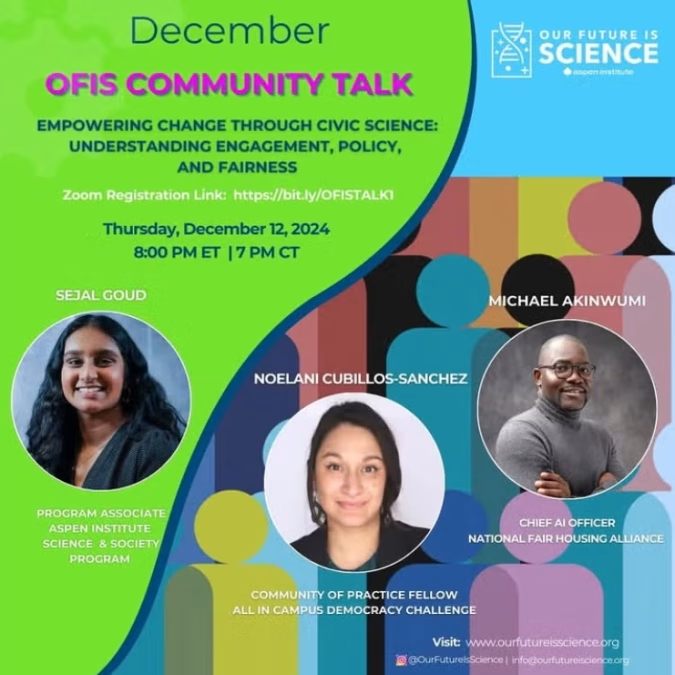The first whole human genome sequencing cost around $2.7 billion in 2003. Today, an individual’s genome can be sequenced for under $1,000. Sequencing’s availability and efficiency have given rise to the possibility that each of us can use our personal genetic information to discover previously unattainable information about susceptibility for specific diseases and ability to respond to particular drugs. In some circles, personal genomics has been touted as the future of healthcare, enabling, for example, families to learn of their increased likelihood of having breast cancer signaled by carrying mutations in particular genes. Empowered with this knowledge and in consultation with their physicians, patients can make lifestyle and medical choices to thwart possible disease onset or progression. While such actions cannot alter one’s genome, they can alter one’s epigenome, which determines how the genome is interpreted by the body with regard to health and disease. This program’s discussion will dive into the latest scientific advances in personalized and preventive genomics and possibilities for new approaches to medicine, while contextualizing these advances from sociological, ethical, and legal standpoints.
Join us for a conversation featuring medical geneticist and physician-scientist Dr. Robert Green and Berggruen Fellow and historian and sociologist of the life sciences Dr. Hannah Landecker in conversation with Science & Society Program Director Aaron Mertz. This program is held in partnership with the Institute’s Science & Society Program.
**If you are not currently a Society of Fellows member, and are interested in joining, please contact the SOF team at [email protected] or at (970) 544-7980 from 9:00 a.m. – 5:00 p.m. MST.
Speakers:
 Robert C. Green, MD, MPH is Professor of Medicine (Genetics) at Harvard Medical School and a physician-scientist who directs the G2P Research Program at Brigham and Women’s Hospital and the Broad Institute. Dr. Green is internationally recognized for research and policy efforts accelerating the implementation of genomic/precision medicine.
Robert C. Green, MD, MPH is Professor of Medicine (Genetics) at Harvard Medical School and a physician-scientist who directs the G2P Research Program at Brigham and Women’s Hospital and the Broad Institute. Dr. Green is internationally recognized for research and policy efforts accelerating the implementation of genomic/precision medicine.
 Hannah Landecker, PhD, is Professor of Sociology and Director of the Institute for Society and Genetics at the University of California, Los Angeles. Dr. Landecker uses tools of history and social science to study contemporary developments in the life sciences and their historical taproots in the twentieth century and is the author ofCulturing Life: How Cells Became Technologies.
Hannah Landecker, PhD, is Professor of Sociology and Director of the Institute for Society and Genetics at the University of California, Los Angeles. Dr. Landecker uses tools of history and social science to study contemporary developments in the life sciences and their historical taproots in the twentieth century and is the author ofCulturing Life: How Cells Became Technologies.
Moderator:
 Aaron F. Mertz, PhD, moderator, is a biophysicist, Rhodes Scholar, and Director of the Aspen Institute Science & Society Program, which aims to generate greater public appreciation for science as a vital tool to address global challenges and to foster a diverse scientific workforce whose contributions extend beyond the laboratory.The first whole human genome sequencing cost around $2.7 billion in 2003. Today, an individual’s genome can be sequenced for under $1,000. Sequencing’s availability and efficiency have given rise to the possibility that each of us can use our personal genetic information to discover previously unattainable information about susceptibility for specific diseases and ability to respond to particular drugs. In some circles, personal genomics has been touted as the future of healthcare, enabling, for example, families to learn of their increased likelihood of having breast cancer signaled by carrying mutations in particular genes. Empowered with this knowledge and in consultation with their physicians, patients can make lifestyle and medical choices to thwart possible disease onset or progression. While such actions cannot alter one’s genome, they can alter one’s epigenome, which determines how the genome is interpreted by the body with regard to health and disease. This program’s discussion will dive into the latest scientific advances in personalized and preventive genomics and possibilities for new approaches to medicine, while contextualizing these advances from sociological, ethical, and legal standpoints.
Aaron F. Mertz, PhD, moderator, is a biophysicist, Rhodes Scholar, and Director of the Aspen Institute Science & Society Program, which aims to generate greater public appreciation for science as a vital tool to address global challenges and to foster a diverse scientific workforce whose contributions extend beyond the laboratory.The first whole human genome sequencing cost around $2.7 billion in 2003. Today, an individual’s genome can be sequenced for under $1,000. Sequencing’s availability and efficiency have given rise to the possibility that each of us can use our personal genetic information to discover previously unattainable information about susceptibility for specific diseases and ability to respond to particular drugs. In some circles, personal genomics has been touted as the future of healthcare, enabling, for example, families to learn of their increased likelihood of having breast cancer signaled by carrying mutations in particular genes. Empowered with this knowledge and in consultation with their physicians, patients can make lifestyle and medical choices to thwart possible disease onset or progression. While such actions cannot alter one’s genome, they can alter one’s epigenome, which determines how the genome is interpreted by the body with regard to health and disease. This program’s discussion will dive into the latest scientific advances in personalized and preventive genomics and possibilities for new approaches to medicine, while contextualizing these advances from sociological, ethical, and legal standpoints.
Join us for a conversation featuring medical geneticist and physician-scientist Dr. Robert Green and Berggruen Fellow and historian and sociologist of the life sciences Dr. Hannah Landecker in conversation with Science & Society Program Director Aaron Mertz. This program is held in partnership with the Institute’s Science & Society Program.
**If you are not currently a Society of Fellows member, and are interested in joining, please contact the SOF team at [email protected] or at (970) 544-7980 from 9:00 a.m. – 5:00 p.m. MST.
Speakers:
 Robert C. Green, MD, MPH is Professor of Medicine (Genetics) at Harvard Medical School and a physician-scientist who directs the G2P Research Program at Brigham and Women’s Hospital and the Broad Institute. Dr. Green is internationally recognized for research and policy efforts accelerating the implementation of genomic/precision medicine.
Robert C. Green, MD, MPH is Professor of Medicine (Genetics) at Harvard Medical School and a physician-scientist who directs the G2P Research Program at Brigham and Women’s Hospital and the Broad Institute. Dr. Green is internationally recognized for research and policy efforts accelerating the implementation of genomic/precision medicine.
 Hannah Landecker, PhD, is Professor of Sociology and Director of the Institute for Society and Genetics at the University of California, Los Angeles. Dr. Landecker uses tools of history and social science to study contemporary developments in the life sciences and their historical taproots in the twentieth century and is the author ofCulturing Life: How Cells Became Technologies.
Hannah Landecker, PhD, is Professor of Sociology and Director of the Institute for Society and Genetics at the University of California, Los Angeles. Dr. Landecker uses tools of history and social science to study contemporary developments in the life sciences and their historical taproots in the twentieth century and is the author ofCulturing Life: How Cells Became Technologies.
Moderator:
 Aaron F. Mertz, PhD, moderator, is a biophysicist, Rhodes Scholar, and Director of the Aspen Institute Science & Society Program, which aims to generate greater public appreciation for science as a vital tool to address global challenges and to foster a diverse scientific workforce whose contributions extend beyond the laboratory.
Aaron F. Mertz, PhD, moderator, is a biophysicist, Rhodes Scholar, and Director of the Aspen Institute Science & Society Program, which aims to generate greater public appreciation for science as a vital tool to address global challenges and to foster a diverse scientific workforce whose contributions extend beyond the laboratory.











